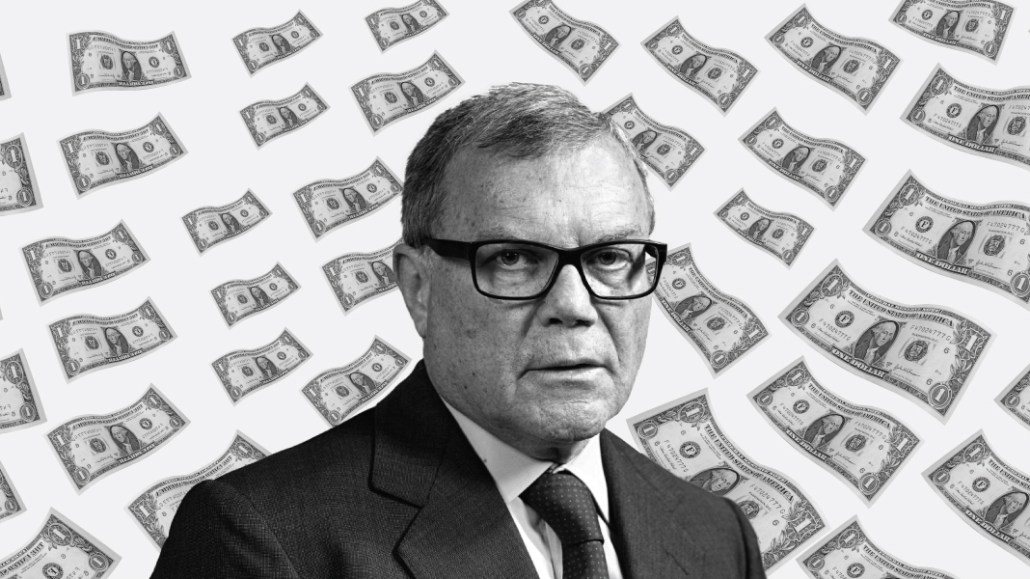Save 50% on a 3-month Digiday+ membership. Ends Dec 5.

If Martin Sorrell wants to make WPP 2.0, he has his work cut out for him.
The former WPP CEO announced May 30 that Derriston Capital, a British investment company, will acquire a Sorrell-backed investment vehicle called S4 Capital. S4 Capital was set up with £40 million ($53 million) from Sorrell and another £11 million ($15 million) from institutional investors. Derriston will be renamed S4 Capital. An S4 spokesperson said the company’s goal is to make a global advertising, marketing and ad tech company, by acquisition.
In a financial filing on May 30, Derriston said Sorrell could own over 30 percent of the company, which will focus on an acquisition strategy to build a “multinational” communications business. S4 is already in preliminary discussions about acquisition targets — the idea is to focus on tech, data and content businesses.
“Sorrell’s name still clearly carries weight, as evidenced by the $150 million already promised by investors for the M&A pot,” said Keith Hunt, managing partner at Results International, who advises on mergers and acquisitions in advertising. “At WPP, Sorrell was weighed down by the heritage of a highly traditional [marketing communications] business. With S4 Capital, he has a clean sheet and an opportunity to create something truly different.”
Most acquisitions, added Hunt, would have to be in the £10 million ($13 million) to £100 million ($133 million) range by default because there are fewer acquisition targets.
But a “multinational business” sounds an awful lot like a holding company.
Sorrell will likely create a new holding company, similar to the way he built WPP. “I don’t see him going into media, and I don’t see why he would do a lot of ad tech, given that that would mean rolling up a bunch of companies,” said one top agency executive over breakfast on May 30. “That leaves agencies — something he knows and is, frankly, really good at.”
Ad position: web_incontent_pos1
Nobody expected Sorrell to go quietly. Speaking at a conference in New York at the beginning of May, he announced he wasn’t retiring. “I’m going to start again,” he told attendees.
But holding companies seem like a relic from an outdated time. They were mostly created because agencies could talk about the economies of scale that advertisers could get from larger companies, and agencies could avoid conflict situations with different clients in the same industry inside one company.
But even as holding companies still talk big about so-called rate discounts, the reality is it hasn’t panned out. For many brand marketers, rate discounts are rarely enough. Take Kristin Lemkau, the outspoken chief marketing officer at JPMorgan Chase, who has made it part of her mission to question whether holding companies make sense today. “What ends up happening is brands keep switching holding companies, and they bring it down to a lower rate by squeezing the media companies,” said Lemkau, who is counteracting that by pouring resources into Chase’s in-house agency, Inner Circle.
Hunt said the ideal situation would be a holding company without the issues of legacy companies — too much sprawl, too many discounts and too much emphasis on the margin.
But even as Sorrell worked over the last few years to whittle down WPP business lines to combat sprawl and ramp up consolidation — he brought together several media agencies within GroupM, and he combined branding and design firms under a company called Superunion — it still didn’t mitigate the threat of both in-house agencies and consultancies, which continue to eat away at agency business.
Ad position: web_incontent_pos2
And internally, holding companies have suffered, according to one former WPP executive, because they manage to margins. “The agency of the future may look very different to 400 acquisitions under one umbrella business,” this person said.
More in Marketing

Ulta, Best Buy and Adidas dominate AI holiday shopping mentions
The brands that are seeing the biggest boost from this shift in consumer behavior are some of the biggest retailers.

U.K. retailer Boots leads brand efforts to invest in ad creative’s data layer
For media dollars to make an impact, brands need ad creative that actually hits. More CMOs are investing in pre- and post-flight measurement.
Ad position: web_bfu
